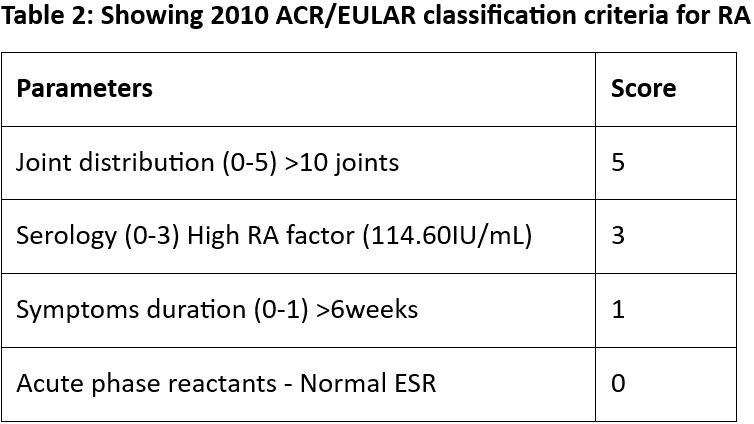Intervention of Amavata (Rheumatoid Arthritis) through Ayurvedic approach
DOI:
https://doi.org/10.21760/jaims.10.4.50Keywords:
Agni, Ama, Vata Dosha, Autoimmune disease, Chronic symmetrical polyarthritis, Synovial inflammation, Cartilage destruction, Bone erosion, Joint deformities, NSAIDs, Joint pain, Swelling, Morning stiffnessAbstract
Introduction: Amavata is an Ama Pradoshaja Vikara, caused by Agnimandya, which leads to accumulation of Ama in Shleshmasthana and Prakopa of Vata Dosha. It closely resembles the chronic inflammatory auto immune disorder called Rheumatoid Arthritis. Clinical features ranges from mild inflammation to complete degenerative changes of joint. Prevalence of R.A is approximately 0.8% worldwide and 0.5-0.75% in India. Materials and Methods: A 36 year old female patient came to OPD of Kayachikitsa Dept. with complaint of multiple joint pain, stiffness and swelling particularly affecting the wrists, knees and hands since 8 years but symptoms have exaggerated from last 8-9 months. Diagnostic evaluation confirmed the presence of rheumatoid factor (RF) and CRP was found raised. Conventional treatments, such as DMARDs & NSAIDs were initiated but resulted in only partial symptom relief. Patient was treated with Kshara Basti for 30 days along with oral ayurvedic medicine such as Rasanadi Kwatha, Eranda Sneha, Chitrakadi Vati, Simhanad Guggulu etc. These modalities help in Amapachan, Vatashaman and Srotas Shodhan. Dietary recommendations emphasized warm, easily digestible foods, and the reduction of cold, heavy, and processed items to mitigate Ama formation. Conclusion: The Ayurvedic approach led to significant improvements in the patient's symptoms, including reduced joint pain and stiffness, enhanced mobility, and overall better quality of life. This case study illustrates the potential benefits of integrating Ayurvedic therapies with conventional treatment to manage Amavata effectively. It highlights the importance of a holistic approach in treating chronic autoimmune conditions and encourages further exploration of Ayurvedic practices in contemporary rheumatology.
Downloads
References
Madhav V, Kanthdatta, Vijayrakshit. Mahdav Nidana, Amavata Nidana Adhyaya. Edited by Sudarshan Shastri. Reprint ed. Varanasi: Chaukhambha Prakashan; 2008. p. 508.
Harrison, Longo, Fauci, Kasper et al. Harrison’s Principles of Internal Medicine. 18th ed. Vol. 2. New York: McGraw-Hill; p. 2738.
Harrison, Longo, Fauci, Kasper et al. Harrison’s Principles of Internal Medicine. 18th ed. Vol. 2. New York: McGraw-Hill; p. 2738.
Shah SN, Anand MP et al. API Textbook of Medicine. 7th ed. Mumbai: Association of Physicians of India; p. 1160.
Tripathi JP, editor. Chakradutta of Chakrapanidutta with Savimarsha ‘Bhavarthasandipani’. Amavata Chikitsa, Ver. 1. 5th ed. Varanasi: Chaukhamba Sanskrit Series; p. 225.
Tripathi JP, editor. Chakradutta of Chakrapanidutta with Savimarsha ‘Bhavarthasandipani’. Niruhadhikarah, Ver. 30-32. 5th ed. Varanasi: Chaukhamba Sanskrit Series; p. 603.
Tripathi JP, editor. Chakradutta of Chakrapanidutta with Savimarsha ‘Bhavarthasandipani’. Niruhadhikarah, Ver. 30-32. 5th ed. Varanasi: Chaukhamba Sanskrit Series; p. 603.















